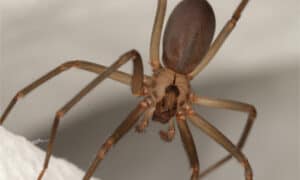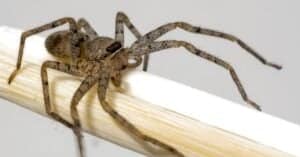If you’ve landed on our page, you’re either a spider enthusiast or have seen some spiders around your house, and you’re not a big fan. In any case, we’re here to help you with this!
Wolf spiders, fishing spiders, nursery web spiders, black and yellow Argiope spiders, giant house spiders, and grass spiders are only some of the largest spiders found in Michigan. Since the wolf spider is the largest among these, we’ll tell you everything you need to know about it!
About the wolf spider
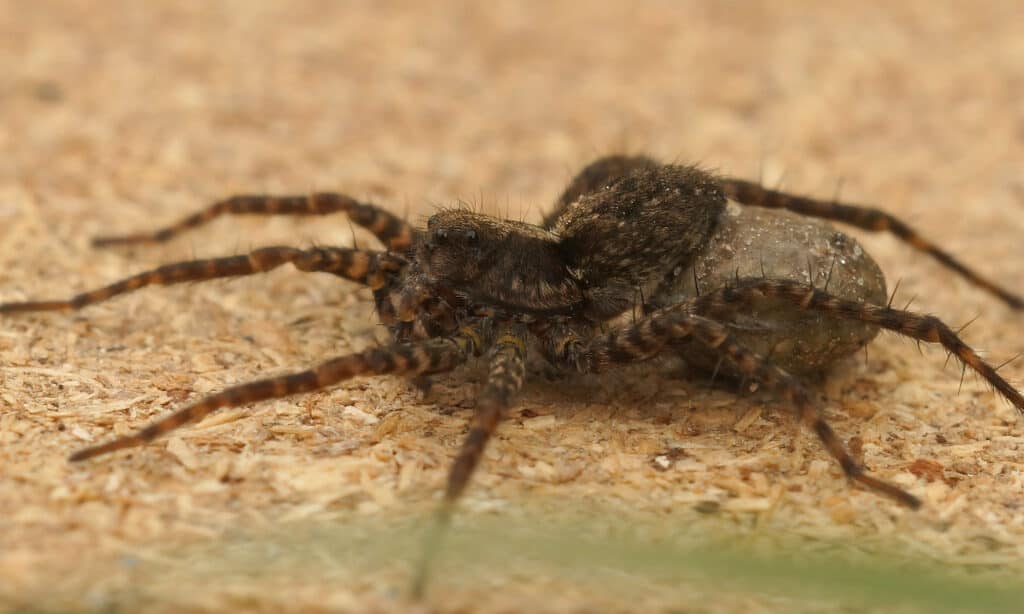
Wolf spiders are highly adaptable carnivorous spiders in the family
Lycosidae.
©HWall/Shutterstock.com
Wolf spiders are highly adaptable carnivorous spiders in the family Lycosidae. They are also called hunting spiders or ground spiders due to their distinctive way of catching prey – that is, they hunt their prey like a wolf (hence the name) because they do not have the ability to make elaborate webs. The tiny claws located at the end of their legs are of great help during hunting, making them excellent at this.
Some wolf spiders are not active predators. Wolf spiders Lycosa Lugubris, for example, do not chase their prey but rather catch what comes across. The study says that this wolf spider can carry its prey for about two hours.
Wolf spiders are known for their excellent eyesight; they have two very large eyes in the middle row that help them get the best visibility at night. Even more, they’re known to be at the top among spiders when it comes to eyesight.
Wolf spiders usually live in forests, plains, wetlands, deserts, and other similar habitats worldwide, except for Antarctica. Their favorite food consists mainly of insects, such as ants, crickets, or beetles. A wolf spider’s main predators are reptiles, rodents, and birds.
These arachnids are either grey, brown, or yellow; they have a hairy body and weigh less than 1 oz. If they’re in danger, wolf spiders can camouflage themselves appropriately to the habitat in case.
Wolf spiders can range from 0.24 inches to 2+ inches in length. Their lifespan is usually 1 to 2 years. They are the only spiders known to carry their spiderlings on their backs.
Moreover, South Carolina is the only state in the U.S. to have an official spider – the wolf spider.
Are there any wolf spiders in Michigan?
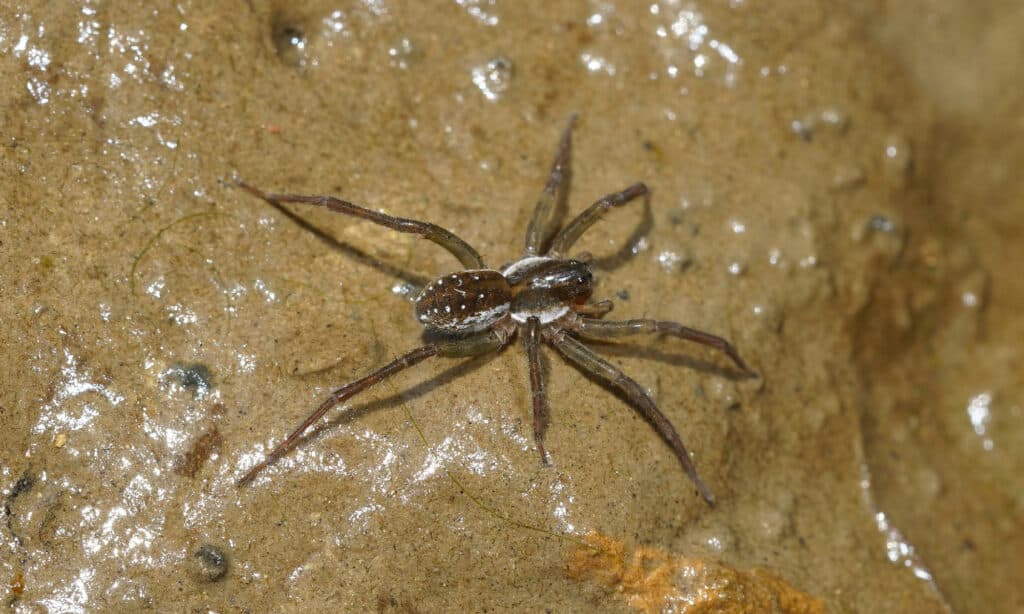
The wolf spider is the largest species of spider found in Michigan.
©HWall/Shutterstock.com
The wolf spider is the largest species of spider found in Michigan. However, most are not dangerous, even though they are pretty big. People often mistake wolf spiders for nursery web spiders. If you’ve found a spider and you can’t decide between the two, check their eyes; a nursery web spider’s eyes are all about the same size, while a wolf spider’s eyes are not.
Are wolf spiders good to have around?
Even though they look scary, wolf spiders are helpful around the household. They have an essential role in the food chain, keeping it and the habitat active. Precisely, they control the insect population and are called “beneficial bugs” because they hunt pest species. So, if you live on a farm or have a garden, you might even want to stumble upon a wolf spider! However, they usually live only in hidden spaces or under leaves, so you’re unlikely to see one, especially during the day.
Are Michigan wolf spiders poisonous?
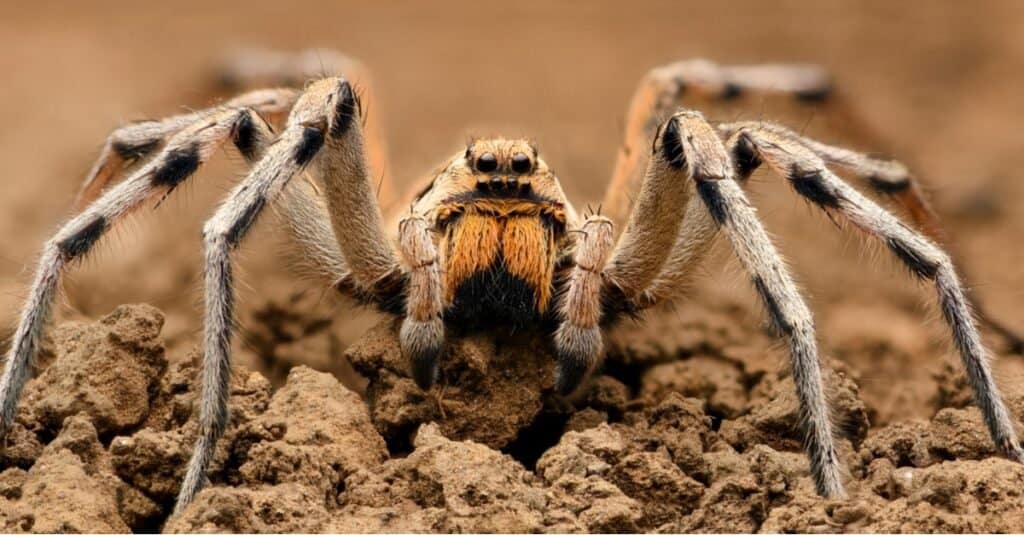
Michigan wolf spider bites can cause symptoms such as allergic reactions.
©Cornel Constantin/Shutterstock.com
A wolf spider’s venom is not poisonous to humans. Michigan wolf spiders are not considered dangerous or poisonous to humans, but their bites can cause symptoms such as allergic reactions or dizziness.
Wolf spiders are not an aggressive species. They’ll only bite if they feel threatened, so if you stumble upon one in your house or yard, do not try to touch or pick it up. It’s crucial not to squish them. Since they’re carrying their spiderlings on their backs, you can “wake them up” and make things worse. If you’re not threatening a wolf spider, it will just leave and go on with its business.
To prevent spiders from settling into your household, you’ll need to keep your house clean and clutter-free.
What happens if a wolf spider bites you?
If a wolf spider somehow bites you, it will leave a bite wound. First, clean the bite site with warm water and soap and cover it with clean bandages. The spider’s venom makes the wound a bit itchy, while its fangs will make it sting. It’s important to keep calm, as there’s no danger! If your immune system works well, you’ll only get a reddish, swollen bump that will heal within a few days. If your immune system is weak, you can develop severe allergic reactions such as difficulties in breathing, dizziness, swollen face, and elevated heart rate. In this case, you need to seek immediate medical attention.
Are wolf spiders poisonous to pets?
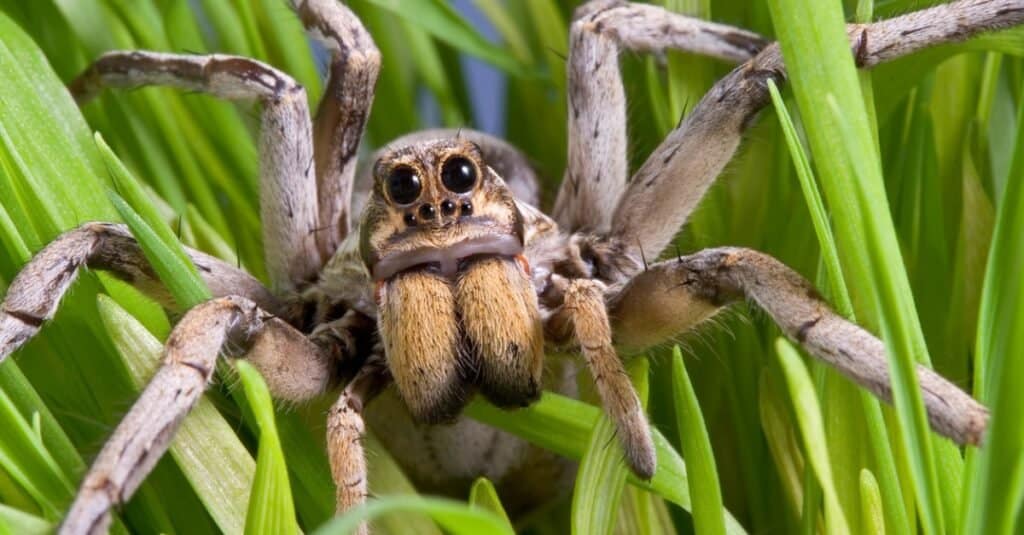
Wolf spiders are poisonous to animals, including dogs and cats.
©iStock.com/CathyKeifer
Wolf spiders are poisonous to animals, including dogs and cats. If not treated, it can be fatal. However, as their venom is adapted only to catch and paralyze small prey, it will have a stronger effect on smaller pets. Pets being bitten by wolf spiders is pretty uncommon, as animals are usually intuitive and stay away from spiders, while spiders won’t dare approach a dog or a cat due to their size. Still, as intuitive as they can be, some pets are playful and curious and may chase a spider just for fun. We suggest keeping an eye on your pets if you know there are spiders around the house.
How to identify wolf spider bites on pets?
Pets will most likely lick the bite site, hold their paw up in the air, and limp. Unfortunately, it is almost impossible to understand whether the bite came from a wolf spider or another type of spider. We advise seeking immediate veterinary care if you notice your pet has been bitten.
The photo featured at the top of this post is © Lukas Jonaitis/Shutterstock.com
Thank you for reading! Have some feedback for us? Contact the AZ Animals editorial team.



